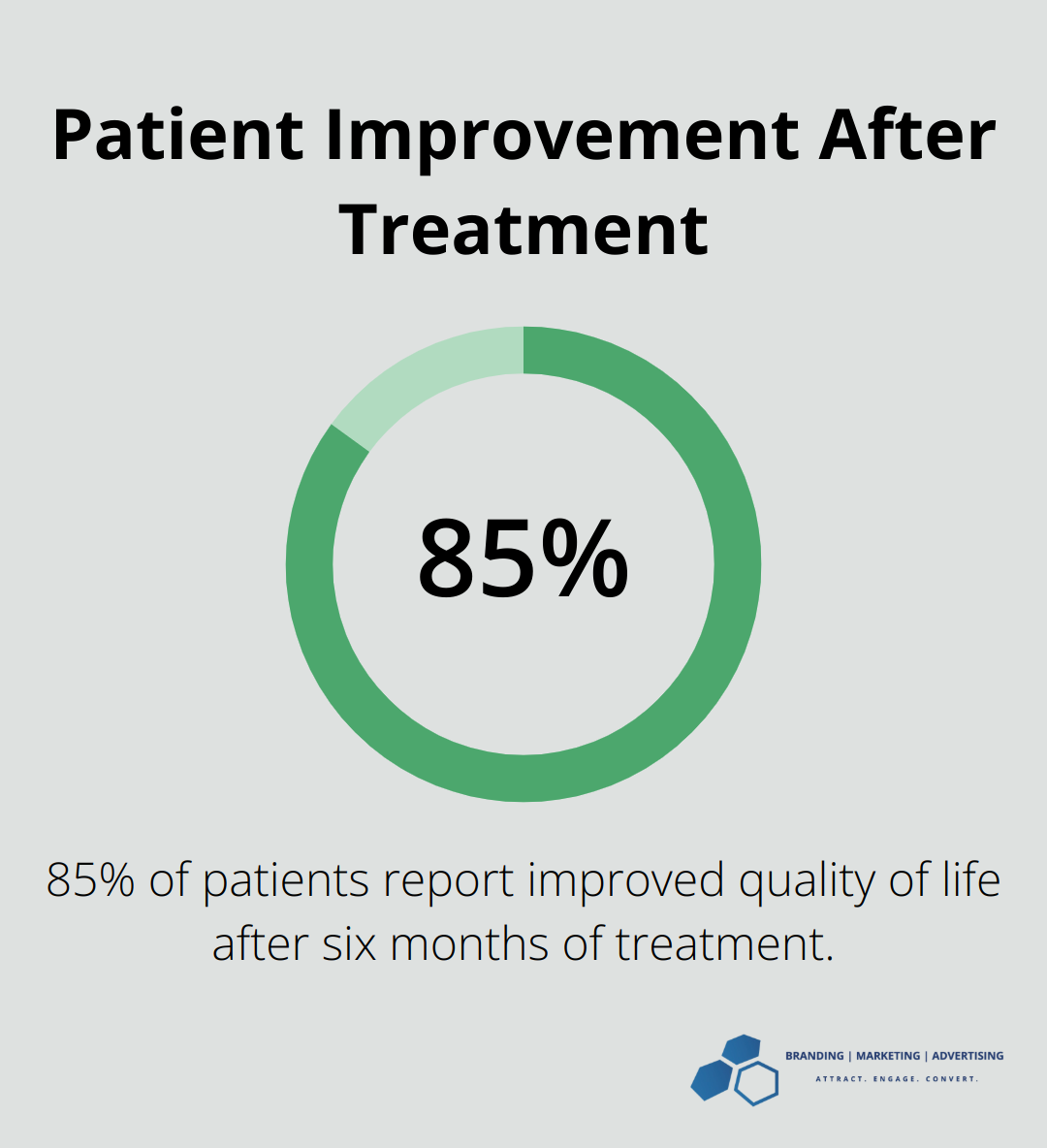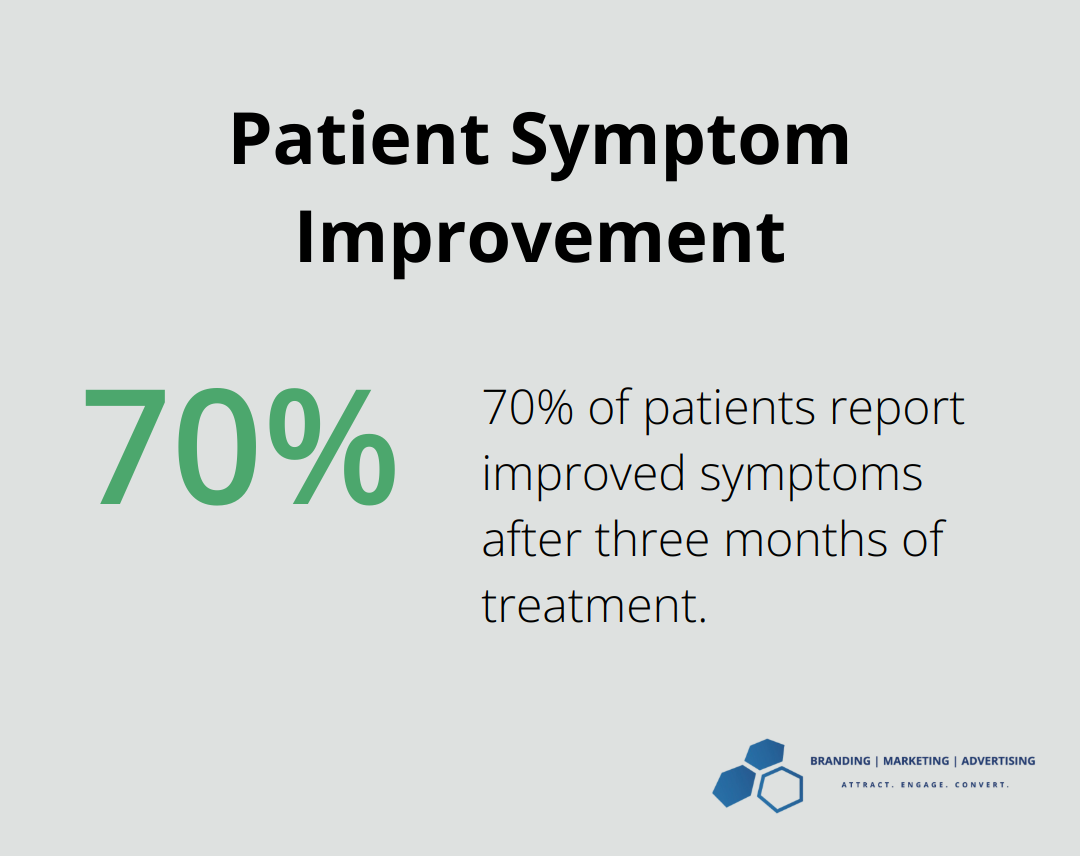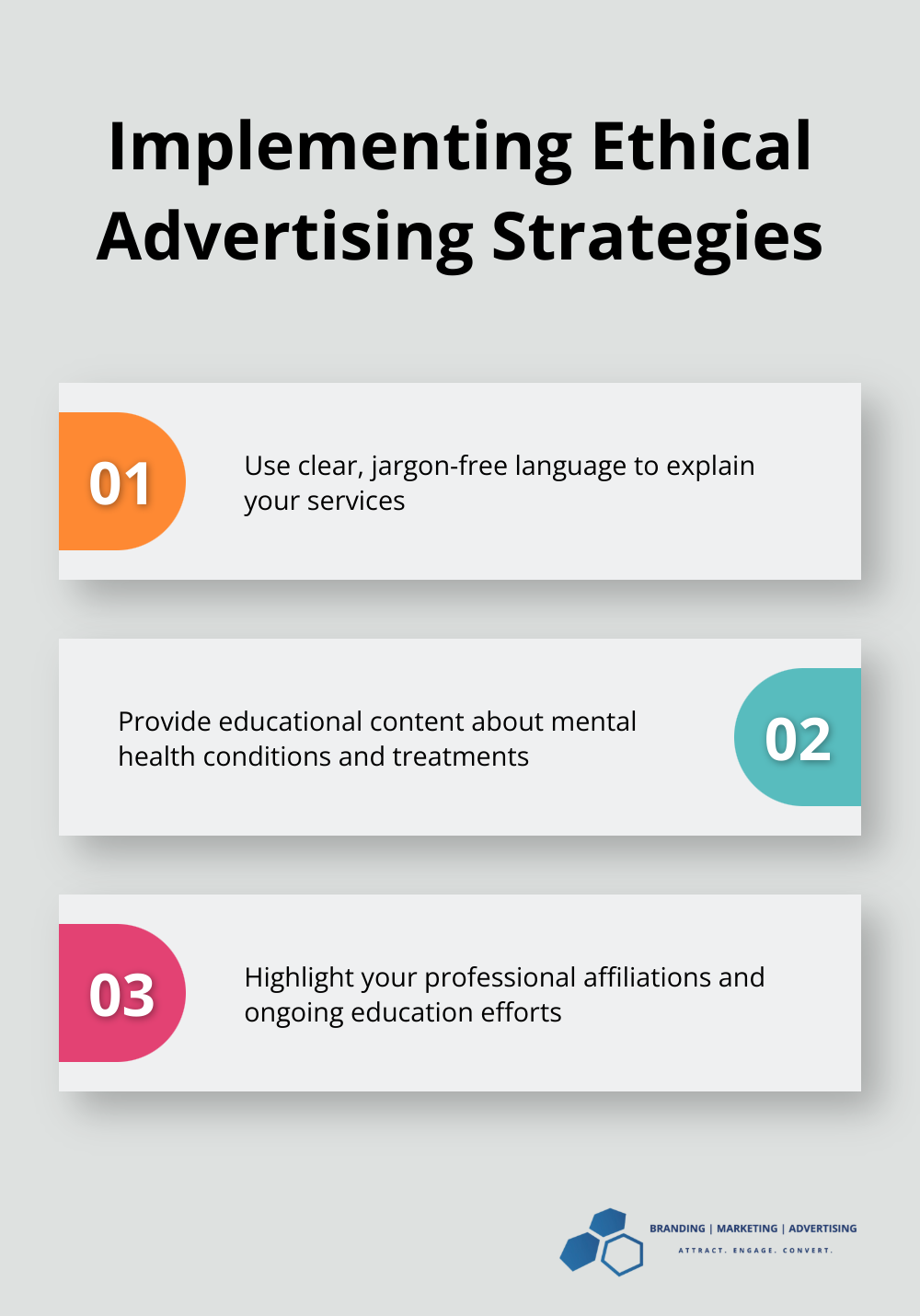Ethical Advertising Strategies for Psychiatry Services
At Branding | Marketing | Advertising, we understand the unique challenges of psychiatry advertising. Balancing ethical responsibilities with marketing goals is essential in this sensitive field.
Effective psychiatry advertising builds trust, adheres to professional standards, and respects patient confidentiality. In this post, we’ll explore ethical strategies to promote psychiatric services while maintaining integrity and credibility.
Trust: The Foundation of Ethical Psychiatry Advertising
The Power of Transparency
In psychiatry advertising, trust forms the cornerstone of success. Transparency builds credibility. A study by the American Psychiatric Association identified ten categories of patient preferences, including interactions with health care staff, involvement in care, diagnosis and symptom relief, and interpersonal factors. This preference underscores the importance of being upfront about expertise, services, and treatment expectations.
Navigating Regulatory Waters
Adherence to professional standards demonstrates a commitment to patient care. The American Medical Association’s Code of Medical Ethics provides guidelines for advertising medical services. Following these guidelines shows potential patients that their well-being takes priority over profit.
Striking the Right Balance
The challenge lies in balancing marketing goals with ethical responsibilities. We recommend focusing on educational content that addresses common mental health concerns. This approach attracts potential patients and positions you as a trusted resource in the community.
For instance, a blog post titled “5 Signs You Might Need to See a Psychiatrist” provides valuable information while subtly promoting your services.
The Impact of Patient-Centered Messaging
Emphasizing a patient-centered approach in advertising significantly boosts trust. A survey conducted provides innovative guidelines for the development of virtual therapeutic assistants to fill the gaps in patient aftercare.
One effective strategy highlights a commitment to personalized care. Consider creating a video series discussing your approach to treatment, emphasizing how you tailor methods to each patient’s unique needs.
Leveraging Social Proof Ethically
While patient testimonials can be powerful, they require extreme care in psychiatry advertising. Instead of using individual patient stories, share aggregate data about patient satisfaction or treatment outcomes. For example: “85% of our patients report improved quality of life after six months of treatment.”

Building Trust Through Community Engagement
Participation in community mental health initiatives enhances credibility and visibility. Try partnering with local organizations for mental health awareness events or offering free educational workshops. These activities serve the community and showcase your expertise and commitment to mental health.
The Role of Digital Presence in Trust-Building
In today’s digital age, your online presence plays a vital role in building trust. A professional, user-friendly website that provides clear information about your services, qualifications, and approach to treatment is essential. Regular updates with helpful resources and blog posts further establish your authority in the field.
Trust in advertising strategies not only attracts patients but also lays the foundation for long-term success in your psychiatry practice. In mental health care, trust isn’t just a marketing tool-it’s the very essence of effective treatment. As we move forward, let’s explore the key elements that make up ethical advertising for psychiatry services.
Crafting Ethical Psychiatry Ads
At Branding | Marketing | Advertising, we believe ethical advertising in psychiatry creates genuine connections with potential patients while maintaining the highest standards of professional integrity.
Showcasing Expertise Accurately
Accurate representation of qualifications and services is paramount in psychiatric advertising. The American Psychiatric Association issued a 2023 report on the future of psychiatry, focusing on how the organization should position itself in the evolving healthcare landscape. This underscores the importance of clearly stating your qualifications, certifications, and areas of expertise.
Specify your specializations instead of making vague claims. If you’re board-certified in child and adolescent psychiatry, highlight this. If you have additional training in cognitive-behavioral therapy, mention it. This level of detail builds trust and helps potential patients find the right match for their needs.
Setting Clear Expectations
Clear communication about treatment options and expectations is vital. A 2025 review highlights the profound influence of adherence on clinical outcomes, healthcare costs, and patient quality of life.
Create a FAQ section on your website addressing common questions about treatment duration, frequency of sessions, and potential outcomes. For example, if you offer telepsychiatry services, clearly outline how these sessions work and what technology patients will need.
Avoiding Sensationalism
In the competitive field of mental health services, it’s tempting to make bold claims. However, avoiding sensationalism and false promises maintains ethical standards and patient trust.
Focus on educating potential patients about the process of mental health treatment instead of promising “instant cures” or “guaranteed results.” Share success stories in aggregate form, such as “70% of our patients report improved symptoms after three months of treatment.”

Protecting Patient Privacy
Respecting patient confidentiality in advertising is non-negotiable. The Health Insurance Portability and Accountability Act (HIPAA) sets strict guidelines for patient privacy, and violating these can result in severe penalties.
Always obtain written consent and remove any identifying information when using testimonials or case studies. Better yet, use composite case studies that blend elements from multiple patients to illustrate your approach without compromising individual privacy.
Implementing Ethical Strategies
Ethical advertising in psychiatry requires a delicate balance of promoting services while respecting the sensitivity of mental health issues. Try these strategies to create effective marketing that attracts patients and upholds the highest standards of the profession:
- Use clear, jargon-free language to explain your services (this helps patients understand their options).
- Provide educational content about mental health conditions and treatments.
- Highlight your professional affiliations and ongoing education efforts.
As we move forward, let’s explore how to develop a comprehensive ethical marketing plan that aligns with these principles and effectively reaches your target audience.
How to Implement Ethical Advertising in Psychiatry
Developing an Ethical Marketing Plan
The first step to implement ethical advertising strategies is to create a robust marketing plan. This plan should align with your practice’s values and the ethical guidelines set by professional bodies like the American Psychiatric Association.
Define your target audience. Do you specialize in treating anxiety disorders, depression, or ADHD? Understanding your niche helps tailor your messaging appropriately. Next, outline your unique value proposition. What sets your practice apart? It might be your expertise in cognitive-behavioral therapy or your focus on holistic treatment approaches.
Include a content calendar in your plan. This ensures a consistent flow of informative, educational content that adds value to your audience. You might plan a series of blog posts about common mental health myths, each addressing a different misconception.
Selecting Appropriate Channels
The selection of appropriate channels is key to reach your target audience effectively. While social media can be a powerful tool, use it judiciously in psychiatry advertising. Platforms like LinkedIn can be excellent for sharing professional insights and connecting with other healthcare providers.
Your website should serve as the hub of your online presence. Make it user-friendly, mobile-responsive, and provide clear information about your services. A well-optimized website can capture traffic and convert it into potential patients.
Consider an investment in search engine optimization (SEO) to improve your visibility in search results. This can be particularly effective for local searches, helping potential patients in your area find your services.
Creating Valuable Content
Content is king in ethical advertising for psychiatry services. Focus on the creation of informative, educational content that addresses common mental health concerns. This not only attracts potential patients but also positions you as a trusted resource in your field.
You could create a video series that explains different types of therapy and their benefits. Or write blog posts that address frequently asked questions about psychiatric medications. Always provide accurate, evidence-based information.
Avoid sensationalism or overpromising results. Instead, educate your audience about mental health and the treatment process. This approach builds trust and helps set realistic expectations for potential patients.
Patient-Centered Messaging
Maintain a patient-centered approach in all your advertising efforts. This means developing a multi-channel communication strategy, prioritizing clear and accessible messaging for older patients, and implementing patient-centric communication practices.
Consider the sharing of anonymized success stories or aggregate data about treatment outcomes. This provides social proof without a compromise of patient confidentiality.
Collaboration for Credibility
Partnerships with reputable mental health organizations can significantly boost your credibility. Consider collaboration with local mental health advocacy groups or participation in community awareness events.
You could offer talks at local schools or community centers about mental health topics. This not only serves the community but also showcases your expertise and commitment to mental health education.
Ethical advertising in psychiatry is about more than just the attraction of patients. It’s about trust-building, value provision, and contribution to better mental health outcomes in your community. These strategies can help you create an advertising approach that’s both effective and ethically sound.

Final Thoughts
Ethical psychiatry advertising builds trust and credibility with potential patients. It requires accurate representation of qualifications, clear communication of treatment options, and respect for patient confidentiality. These strategies align marketing efforts with the highest standards of professional integrity in the mental health field.
The landscape of psychiatry advertising changes constantly due to new regulations, technological advancements, and evolving patient expectations. Professionals must evaluate and improve their advertising practices regularly. They should review marketing strategies, stay updated with industry guidelines, and seek feedback from colleagues and patients to refine their approach.
Branding | Marketing | Advertising specializes in creating ethical, effective marketing strategies for healthcare professionals. Our team can help navigate the complexities of psychiatry advertising while maintaining high ethical standards. To learn more about how we can support your practice’s growth, visit our website for comprehensive digital marketing solutions tailored to your needs.












